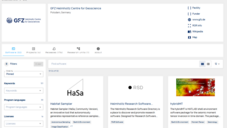With the increasing indispensability of software solutions in the process of gaining scientific knowledge, the sustainable use of research software - i.e. software that is developed and/or used for the purpose of scientific research activities - is part of good scientific practice. In order to meet this requirement and address the associated challenges, the GFZ has been working together since November 2015 to develop and regularly update guidelines, guidelines, processes and other documents and materials that serve as a binding framework and aid in the professional use of research software.
The Open Source Program Office (OSPO) team ensures that GFZ scientists receive the best possible support in the development, dissemination and transfer of their research software.
What is an OSPO?
The concept of the OSPO emerged in the 2000s and originally came from the software industry, but has been successively adopted and further developed outside this sector. The OSPO Alliance, which was founded by European non-profit organizations, defines an OSPO as an organizational unit that offers support in defining and managing the open source strategy as well as the organizational readiness for this strategy (OSPO Alliance, 2021).
The OSPO team at the GFZ combines expertise from the Legal Department, Transfer & Innovation and the eScience Center. In this way, scientists receive competent advice on all relevant aspects of software development and transfer - from legal issues to possible business models and best practices. For us, open science and transfer are equal goals that are not mutually exclusive.
Helmholtz Research Software Directory
The goal at the GFZ is to increase the visibility and discoverability of research software and thus to promote exchange and collaboration within and outside the scientific community.
A selection of software developed at the GFZ for different application areas and target groups can be found in the Helmholtz Research Software Directory.
In addition, the software reporting and license consultation for research software for the GFZ is provided via the Helmholtz Research Software Directory.
Policy & Processes
As a member of the Helmholtz Association - Germany's largest research organization - the GFZ, together with all Helmholtz Centers, has also been shaping the community-wide framework for the sustainable handling and open access of research software required in research, as well as the reuse and transfer for socially relevant applications, since the constitution of the Research Software Task Group of the Open Science Working Group in June 2016.
In the Helmholtz Open Science Policy published in September 2022, the centers of the Helmholtz Association agreed that details on the handling of research software will be regulated in corresponding guidelines for each center and made publicly available by 2025 if possible.
In line with this commitment, information on the regulations and processes established at the GFZ as well as further assistance can be found below. The following video also provides an overview:
Policy on Use and Licensing of Research Software
It is an important strategic goal of the GFZ to utilize software in the best possible way for the benefit of the center and to make it usable in the long term. The guideline on the exploitation and licensing of research software provides strategic measures and binding principles for this purpose. It forms the basic document of the GFZ on this topic and is supplemented by further documents and materials, each covering different aspects of the topic.
Guidelines on research software licensing and dissemination
The GFZ has developed a guideline for the transfer and making available of software. The internal process described therein is intended to ensure that all affected stakeholders of the GFZ are informed and necessary approvals are obtained before software is passed on.
Software reporting process
In order to publish software at GFZ, it must first undergo a review and licensing consultation process. This process is initiated by submitting relevant metadata via a plugin for licensing consultation in the Helmholtz Research Software Directory (currently only possible at GFZ). The submitted software is then reviewed by the Legal Department, Technology Transfer and the eScience Center for compliance with the policy and provided with an appropriate license.
The associated documentation for the license consultation can be found here.
RSE Meet-Up
The GFZ offers many opportunities to network with like-minded people, to exchange ideas and to get actively involved when it comes to software engineering in research. In addition to many interest and working groups, we also host larger networking and information events for our RSE community at GFZ.
On September 14, 2022, our RSE Meet-Up took place at Telegrafenberg. A whole day just about those who develop software in research. The great talks and lively discussions in the individual workshops showed a clear picture: there are already many tools, platforms, infrastructures, processes and personal support opportunities that enable researchers at GFZ to work on sustainable and fair research software development.
Further internal support
In addition to the abov publicly available information on the use of research software at the GFZ, there are further internal documents and materials that are intended to promote and ensure the professional use of research software:
-
Recommended Practices
-
Templates for projects in Python, R, C++, Java, etc.
-
Sample license files and file headers
-
Sample Contributor License Agreements (CLA)
-
Assistance with the application of a Developer Certificate of Origin (DCO)
-
Samples for Software Transfer Agreements
-
Assistance for the tendering of software development contracts
